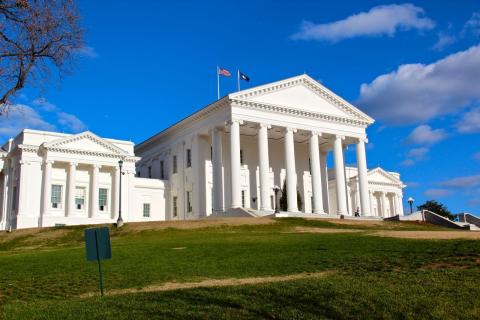
Virginians get their drinking water from two different sources: groundwater or surface water. The water system is highly interconnected, and the land use decisions we make have lasting impacts on the quality and affordability of water. Over the last two decades, Virginia has made significant investments in water quality, resulting in major pollution reductions and improvements to local water quality.
Despite this progress, urban stormwater is the only pollution source that is still growing due to unsustainable land use and transportation policies that have resulted in increased runoff from highways, roads and other impervious surfaces. Agricultural pollution, stormwater runoff, wastewater treatment plants, and septic systems continue to pollute the local streams and rivers that ultimately feed the Chesapeake Bay. The water system is highly interconnected, and the land use decisions we make have lasting impacts on the quality and affordability of water. Where and how we grow has an enormous impact on our air, water, climate, and finances.
That is why it is critical for the General Assembly to make investments to protect clean water, increase transit and green infrastructure, and support land conservation programs. Contact your legislators today.
Virginia’s Biennial Budget
Every two years, the Governor introduces a proposed Budget to the General Assembly. A historic $1 billion in funding to restore the Chesapeake Bay by 2025 was included in Governor Northam’s outgoing budget. Funds to keep our water clean included investments to update failing sewer and septic systems, protect and expand tree canopies, and study the impacts of gold mining.
The budget is moving through the General Assembly for approval, and members of the House Appropriations Committee and Senate Finance and Appropriations Committee will create and report budget proposals based on the Governor's proposal, and craft a budget for submission to Governor-elect Youngkin for final review.
In addition Governor Northam’s conservation funding, Clean Water and our allies support the following amendments in the budget:
Land & Water Conservation
-
$40 million each year for the Virginia Land Conservation Foundation.
-
$3.6 million to the Soil and Water Conservation District for administrative support to meet Virginia’s Bay pollution reduction goals.
-
$600,000 per year to the Virginia Department of Health to continue studying the occurrence of per-and polyfluoroalkyl substances (PFAS), “forever” in the Commonwealth’s public drinking water.
-
$320,000 to the Department of Environmental Quality to support surface and groundwater testing for PFAS linked to harmful health and environmental impacts.
-
$300,000 per year to the Department of Environmental Quality to test fish in Virginia waterways for PFAS chemical contamination.
-
$300,000 per year to the Department of Conservation and Recreation to develop and implement a statewide environmental literacy plan, and to provide assistance to community organizations related to environmental literacy education.
Transit
-
$20 million from the American Rescue Plan Act (ARPA) for incentives and retention bonuses for transit workers.
-
7.5% (estimated $900,000) of annual sports betting revenues to the Transit Transition Fund, to support the transition to zero-emission buses.
Environmental Justice Working Group
-
Extend operation of Virginia’s interagency environmental justice working group in the new biennium budget for completing an assessment of the resources required of state agencies to develop agency-specific environmental justice policies.
Take Action! Voice your support and contact your legislator to pass a budget that prioritizes Virginia’s conservation programs and water and transit infrastructure.
